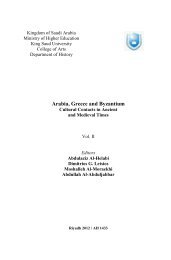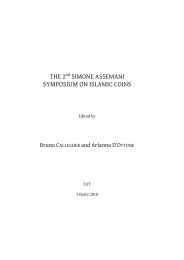ulum-al-quran
ulum-al-quran
ulum-al-quran
Create successful ePaper yourself
Turn your PDF publications into a flip-book with our unique Google optimized e-Paper software.
whosoever follows My guidance on them sh<strong>al</strong>l be no fear, nor sh<strong>al</strong>l they grieve' (Al-Qur'an<br />
2:38)<br />
[I sh<strong>al</strong>l use the following two English translations of the Holy Qur'an: A. Yusuf Ali, (Ali, Abdullah Yusuf:<br />
The Glorious Qur'an: Text, Translation and Commentary. Leicester, 1978) and M. Pickth<strong>al</strong>l (Pickth<strong>al</strong>l,<br />
Mohammad Marmaduke: The Meaning of the Glorious Koran, New York, 1963).]<br />
This message and promise has been communicated by God to <strong>al</strong>l mankind, <strong>al</strong>l children of Adam, as the Qur'an explains:<br />
'O ye children of Adam! Whenever there come to you apostles from amongst you, rehearsing<br />
My signs unto you those who are righteous and mend (their lives) on them sh<strong>al</strong>l be no fear<br />
nor sh<strong>al</strong>l they grieve' (Al-Qur'an 7:35).<br />
The Messengers<br />
The guidance from God comes through the apostles or messengers, and they bringwith them the scripture from God:<br />
'We sent before time Our apostles with clear signs and sent down with them the book and<br />
the b<strong>al</strong>ance (of right and wrong) that men may stand forth in justice ...' (Al-Qur'an 57:25).<br />
The basic message of <strong>al</strong>l prophets from God, and hence of <strong>al</strong>l scriptures they brought, is one and the same message from<br />
God to man:'<br />
'And verily We have raised in every nation a messenger, (proclaiming): Serve Allah and shun<br />
f<strong>al</strong>se gods ...' (Al-Qur'an 16:36).<br />
The Names of the Prophets and their Number<br />
The Qur'an mentions the following prophets by name: Adam, Nuh, Ibrahim, Isma'il, Ishaq, Lut, Ya'qub, Yusuf, Musa,<br />
Harun, Dawud, Sulaiman, Ilyas, Al-Yasa', Yunus, Ayyub, Zakariya, Yahya, 'Isa, Idris, Hud, Dhul Kifl, Shu'aib, S<strong>al</strong>ih,<br />
Luqmaan, Dhul Qarnain, 'Uzair, Muhammad.<br />
This does not mean, however, that only these have been God's prophets. Indeed the Qur'an is very clear that the number<br />
of prophets is much larger and that to each community from among mankind God has sent His messenger:<br />
'We did aforetime send apostles before thee: of them there are some whose story We have<br />
related to thee and some whose story We have not related to thee ...' (Al-Qur'an 40:78).<br />
'To every people (was sent) an apostle ...' (Al-Qur'an 10: 47).<br />
The Names of the Scriptures and their Number<br />
Just as there have been numerous prophets so there were numerous written records of their messages. The Qur'an<br />
mentions the following revelations in particular, which are sometimes c<strong>al</strong>led sheets or leaves (Suhuf) and sometimes book<br />
or scripture (Kitab):<br />
The 'sheets' of Ibrahim and Musa. The Torah (Taurat) of Musa. The Ps<strong>al</strong>ms (Zabur) of Dawud. The Gospel (Injil) of 'Isa.<br />
The Qur'an of Muhammad.<br />
The Contents of the Former Scriptures<br />
All the teachings contained in the former Scriptures that were meant to be of lasting v<strong>al</strong>ue and importance are included in<br />
the Qur'an. The Qur'an <strong>al</strong>so gives some specific accounts, <strong>al</strong>though selective, of what the pre-Qur'anic scriptures<br />
contained and it is worthwhile to look briefly at this materi<strong>al</strong>:<br />
A reference to the 'sheets' (Suhuf) of Ibrahim and Musa:<br />
'But those will prosper who purify themselves, and glorify the name of their guardian Lord,<br />
and (lift their hearts) in prayer. Nay, behold, ye prefer the life of this world; but the<br />
Hereafter is better and more enduring' (Al-Qur'an 87: 14-17).<br />
[Some say that the whole of Sura 87 is a reference to this first book of revelation, but others hold that<br />
only the few verses quoted here are actu<strong>al</strong>ly meant. See mukhtasar tafsir Ibn Kathir, Beirut, 1402/1981,





